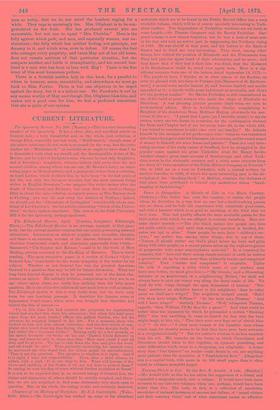Chapters of the History of Yorkshire. By J. J. Cartwright.
(Wake- field: Allen.)—Mr. Cartwright has worked up some of the abundant materials which are to be found in the Public Record Office into a very readable volume, which will be of course specially interesting to York- shire readers. Two biographies of Yorkshire worthies are set forth at some length,—Sir Thomas Gargrave and Sir Martin Frobisher. Gar- grave's name is now almost forgotten, but he was a man of some note in his day, and took an active part in suppressing the Northern rising- of 1569. He was sheriff in that year, and his letters to the Earls of Sussex and to Cecil are very interesting. They show, among other things, how critical the position of Elizabeth and the Protestants was.. They had just the upper hand of their adversaries, and no more ; and they knew that if they lost it their fats was fixed, that the Massacre of St. Bartholomew would be acted over again here. Hero is a sig- nificant sentence from one of the letters, dated September 18, 1572 :— "The people be here, I thynke, as in other places of the Realme, on sorte ys pleased with late facte in Fraturce [the Massacre of St. Bartholo- mew], a second sorb e moche lament yt, and become fearf all and mocha appaulyd at it ; a thyrde wolde same indeforont as newtralls, and thoya. are the grettyst nomber." Sir Martin Frobisher is still remembered as one of the band of great seamen who made the reign of Elizabeth so. illustrious. A less pleasing picture presents itself when we turn to ecclesiastical affairs. Here is Archbishop Sandys complaining to. Burghley of his slanderous Dean, Matthew Hutton, afterwards his suc- cessor in the see. "I grant that I gave (as I lawfully might) to my six sonnes, every one two leases in reversion, for the confirmation whereof the Dean and Chapter had of me for every lease £4, in the whole £48. I am bound in conscience to take care over ray familye." He defends himself by the example of his predecessor, who "when he was translated unto Canterbury gave unto his kinesmen, his servants, and for round somes of money to himself, six score leases and patents." There is a very inter- esting account of the early career of Strafford, how he struggled in the popular cause against his great Yorkshire rival Sir Henry Savile- Another chapter gives some account of Scarborough and other York- shire towns in the sixteenth century, and a sixth some extracts from the diary of three members of the Noble Military Company at Norwich" who in MI set on a tour in Yorkshire, with a journal written by another traveller in 1639, of which the most interesting part is the de- scription of the "heading-block" at Halifax, whereon the clothiers of that place were privileged to behead any malefactor taken "hand- napping or backbearing."


































 Previous page
Previous page